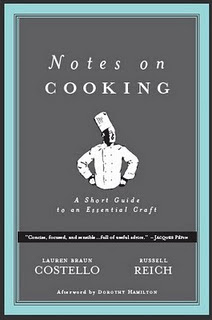“Tonight’s dish will be healthy,” I declare, almost every morning these days.
My husband responds, “Let me guess, you’re adding vegetables to our regular meal?”
That’s right. I still believe – deeply – in the purity of certain dishes. (I’m not one who takes, say, a bowl of nuts and calls it “nutty risotto.” “Risotto” means something and that something isn’t a bowl of nuts.) I do, however, want to be healthier this year. So, if we add something here or there, we've mostly retained the integrity of the original dish (I know, it is a stretch at times.)
To help make healthier meals happen, I’ve declared 2012 THE YEAR OF HEALTH. (When you say this, you have to bang your hands down on the nearest table for emphasis.) I declared it as a writer and now I’m declaring it as a home chef, food shopper and eater.
So, to start, I decided to make penne alla vodka. Ok, you’re thinking that the heavy cream and the vodka make this an obviously unhealthy choice. Here’s the deal: I want to be healthy, but I don’t want to be a. crazy, b. angry or c. deprived by not eating dishes like penne alla vodka. So, I’m preparing penne alla vodka and I’m adding broccoli. There, it is healthier. I’m also going to eat less of it and use a fiber rich pasta: Barrilla’s Piccolini Mini Penne Rich In Fiber. The best part of this pasta is that it tastes a lot like regular pasta and looks the same since it is white.
I admit that I accidentally bought fat free heavy cream, which is a strange invention. It was too thin to fill out the sauce the way it should have. Oh, well.
I admit that I accidentally bought fat free heavy cream, which is a strange invention. It was too thin to fill out the sauce the way it should have. Oh, well.
More or less, I followed this recipe from Epicurious. Instead of scooping out the garlic, I left it in (why take it out?) The main difference though, is that I added the hot pepper to the vodka and let it sit over night (well, a few nights, since I forgot about it the first night.) This step helps to make the dish even spicier. I learned this trick from my great Uncle Bruno.
How do you prepare penna alla vodka?
How do you prepare penna alla vodka?




